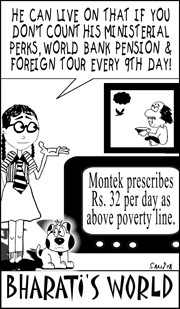New winds of paribartan (change) are not only blowing through the musty corridors of institutions of higher education in the eastern seaboard state of West Bengal (pop. 91 million) — once the country’s most educationally advanced state, now emerging from the wreckage of 34 years of uninterrupted rule of the Communist Party of India-Marxist (CPM) — as reported in these columns last month (September), but also in primary education.
On August 5, Kolkata’s mayor Sovon Chatterjee inaugurated the first English medium primary school of the Kolkata Municipal Corporation (KMC) since independence at Karaya Road, Park Circus. Hitherto, the policy of the state and local governments in West Bengal was to promote primary schools in which the medium of instruction was Bengali, Hindi, Urdu and Oriya. Moreover, immediately after it was elected to power for the first time in 1977, and despite being led by British-trained barrister Jyoti Basu, the CPM banned the teaching of English even as a second language in all government primaries (classes I-VII).
In July 2011, 100 students from slums adjoining Park Circus started classes in KMC’s new English medium primary school. “English is an international language and children need to learn it. It is our responsibility to impart education in English to students,” said Chatterjee, addressing the media after inauguration of the new school.
According to Chatterjee, a member of the Mamata Banerjee-led Trinamool Congress party which swept Kolkata’s municipal elections in June 2010 as a precursor to sweeping the legislative assembly elections in May this year, KMC is the first local government in India to start an English-medium primary school and plans to open six more.
Currently, KMC runs 262 primary schools within Kolkata municipal limits with an aggregate enrolment of 26,971 children from bottom-of-pyramid households. Of them, 184 offer Bengali as the medium of instruction while the rest offer Hindi, Oriya or Urdu media.
 “Although the predecessor CPM government seemed unaware, even poor people are clamouring for English medium education, which offers countrywide employment opportunities for their children, but can’t afford private schools which provide it. This was the driving factor for introducing English medium government schools,” says Dr. Sashi Panja, a municipal councillor and prime mover of this initiative.
“Although the predecessor CPM government seemed unaware, even poor people are clamouring for English medium education, which offers countrywide employment opportunities for their children, but can’t afford private schools which provide it. This was the driving factor for introducing English medium government schools,” says Dr. Sashi Panja, a municipal councillor and prime mover of this initiative.
Since then, Panja, an alumna of R.G. Kar Medical College and Calcutta University, has set about training KMC school teachers in English, roping in English teachers from private schools. A workshop on English language teaching was also organised by the British Council to suggest how KMC teachers could quickly switch to English language teaching. “Currently we have introduced the English curriculum from pre-primary to class I. Initially, we will teach English as a subject in the higher classes until teachers and students are ready to adopt the new medium of study. Meanwhile we have also concluded public-private partnerships with ten private English medium schools in the city which will depute their teachers to provide remedial English language lessons to government school teachers and students,” says Panja.
Following decades of neglect of English — now universally accepted as the global language of business — enabling first generation students (and teachers) of KMC primaries to switch to English medium learning is a monu-mental task, but Kolkata’s academic community has welcomed this initiative. “True it’s a long journey, but a first step in the right direction has been taken to rescue the next generation from the CPM’s educationally bankrupt ideology. This initiative will provide under-privileged children a platform which will give them a better chance to compete,” says Dr. Abhirup Sarkar, professor of economics at the Indian Statistical Institute, Kolkata.
After a long hiatus, the winds of change in West Bengal are blowing in favour of the people rather than the overweening commissars and apparatchiks of the CPM.
Baishali Mukerjee (Kolkata)